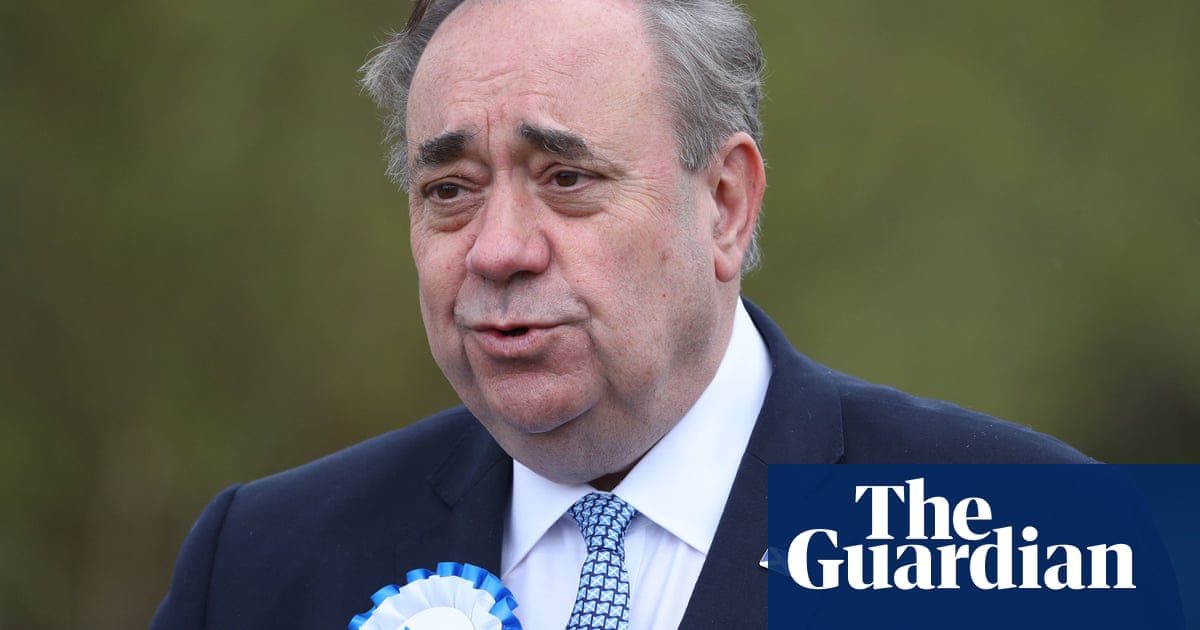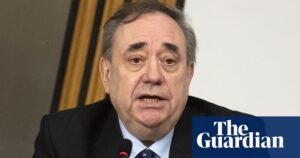
Alex Salmond, the former first minister of Scotland who led Scotland to the brink of independence, has died at the age of 69.
Salmond served as first minister of Scotland from 2007. He stood down from the role after failing to secure independence in the 2014 referendum, handing over to his deputy, Nicola Sturgeon.
Reports suggested that he collapsed after delivering a speech in North Macedonia on Saturday.
Scotland’s first minister, John Swinney, said he was “deeply shocked and saddened”.
“Alex worked tirelessly and fought fearlessly for the country that he loved and for her independence. He took the Scottish National party from the fringes of Scottish politics into government and led Scotland so close to becoming an independent country.”
The British prime minister, Keir Starmer, said Salmond had been a “monumental figure” for more than 30 years.
“He leaves behind a lasting legacy,” he said. “As first minister of Scotland he cared deeply about Scotland’s heritage, history and culture, as well as the communities he represented as MP and MSP over many years of service.
“My thoughts are with those who knew him, his family and his loved ones. On behalf of the UK government, I offer them our condolences today.”
The former SNP leader and former first minister Humza Yousaf said Salmond had “helped to transform the SNP into the dominant political force it is today.
“Alex and I obviously had our differences in the last few years, but there’s no doubt about the enormous contribution he made to Scottish and UK politics.”
Anas Sarwar, the leader of Scottish Labour, said the “sad news of Alex Salmond’s passing today will come as a shock to all who knew him in Scotland, across the UK and beyond”.
He described him as “a central figure in politics over three decades” whose “contribution to the Scottish political landscape cannot be overstated”.
Tom Tugendhat, the UK’s shadow security minister, said Salmond was a “towering figure who shaped our politics for a generation”.
Joanna Cherry, the former SNP MP, said: “I am devastated to hear this news. He was one of the most talented politicians of his generation, and by any measure the finest first minister our country has had. He changed the face of Scottish politics.
“Sadly, he was ill-used by many of his former comrades, and I am particularly sorry that he has not lived to see his vindication. Above all, I shall remember him as an inspiration and a loyal friend. My heartfelt condolences go to Moira, his family, and all who loved him.”
Salmond began his second stint as SNP leader in 2004, securing power in Holyrood in 2007. That was followed by a sweeping victory in Scottish parliamentary elections in 2011 – the precursor to the independence vote.
after newsletter promotion
Salmond was a huge but divisive figure, gaining criticism for his appearances on the Russian state channel RT. He quit the channel after Russia’s invasion of Ukraine in 2022.
He resigned from the SNP in 2018, after allegations of sexual misconduct during his time as first minister in 2013. After lengthy legal battles, he was arrested in 2019 and charged with 14 offences.
He was acquitted of all charges of sexual assault in 2020, when he was found not guilty of 12 charges of attempted rape, sexual assault and indecent assault after six hours of jury deliberations. The jury reached the uniquely Scottish verdict of “not proven” on one charge of sexual assault with intent to rape. Another charge was dropped.
The subsequent Holyrood inquiry into the Scottish government’s handling of the initial harassment complaints led to huge splits within the SNP, with some senior figures backing Salmond, and accusations that he had been the victim of a witch-hunt within the party.
He went on to form the Alba party in 2021, which challenged the SNP on its failure to deliver a second referendum but failed to make electoral headway.
Salmond was rumoured to be considering a return to frontline politics at Holyrood at the next Scottish parliament elections in 2026, with speculation that he might stand for the regional list in the north-east of Scotland.
Reflecting recently on the referendum result, Salmond said he had started to write his concession speech after the first result was declared on the night of the vote. The yes campaign lost the vote, 45% to 55%.
The first result came from Clackmannanshire, often seen as reflecting national sentiment. Voters there backed staying within the UK by 53.8% to 46.2%. “When I saw that result, I started to write my concession speech,” Salmond said.
“Nobody gave us a chance at the start. I always reckoned if we got to the positive side of the argument, if we claimed the positive side for ‘yes’, which in itself is an affirmation, then once we got into the campaign, I thought we’d pick up ground, and so we did.”
Source: theguardian.com


















